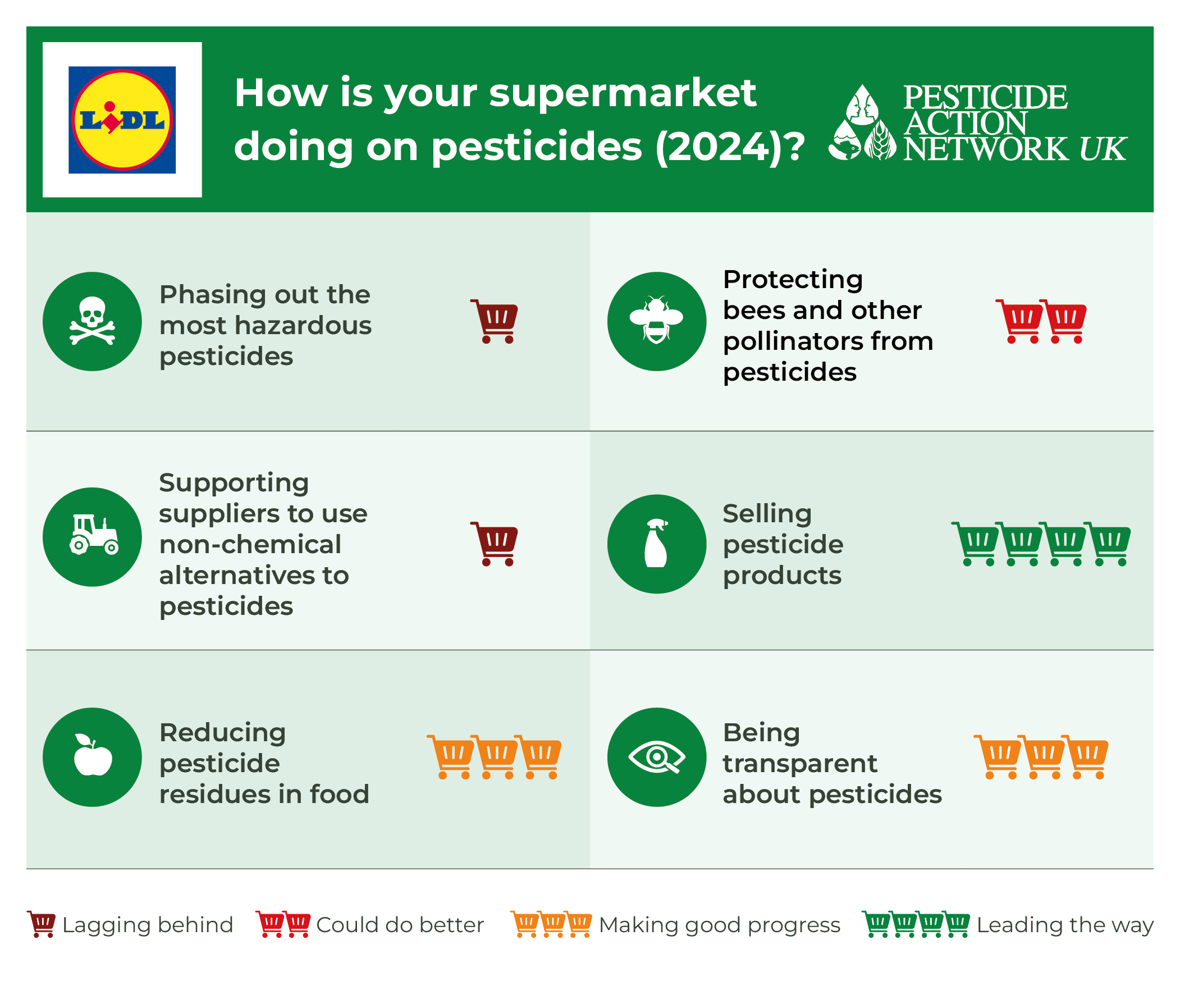Lidl
Lidl received a low overall score and came eighth out of ten supermarkets in the 2024 ranking. The company’s position has dropped by one since the previous ranking in 2021, largely because other supermarkets have made greater progress. While Lidl has made some positive changes over the past three years – such as ending its sale of pesticide products – it continues to lag behind most other UK supermarkets in terms of protecting human health and the environment from pesticides.

What is Lidl doing well?
Phasing out Highly Hazardous Pesticides
- Lidl’s approach includes a focus on phasing out the most Highly Hazardous Pesticides from use within its global supply chains. The company has a list of specific pesticides that should not be used on fruit or vegetable crops. If growers are using any of the pesticides on this list, then they are required to phase them out and find alternatives.
Supporting suppliers to use non-chemical alternatives to pesticides
- Lidl uses third-party sustainable farming schemes which do make some efforts to reduce pesticide-related harms to both the environment and human health. All of Lidl’s UK growers are LEAF Marque certified, and their international growers are certified under Global.G.A.P. The company has developed a new ‘BioDiversity’ module with GlobalG.A.P which includes limits on pesticide use and is being trialled across 250 farms in its supply base.
Reducing pesticide residues in food
- It tests a range of food types for pesticide residues including fruit, vegetables, herbs, species, nuts and wheat products such as bread and pasta. When this testing detects a residue that reaches a third (33%) of the legal safety limit, the results are shared with the supplier in question. If two-thirds (66%) of the safety limit is reached then a limited investigation is triggered, which includes working closely with the supplier to understand the root causes of the problem and agreeing an action plan aimed at preventing it from happening again. An investigation is also triggered if Lidl detects the residues of more than five different pesticides on one food item. This is important because chemicals can become more harmful when combined.
Selling pesticide products
- It is one of three UK supermarkets – and the first so-called ‘discount retailer‘– to stop selling synthetic pesticide products in its gardening and pet ranges. It also doesn’t sell biocidal products (such as ant sprays or cockroach powders) which contain hazardous pesticides.
What are Lidl’s priority areas for improvement?
Phasing out Highly Hazardous Pesticides
- Lidl has one list of pesticides (The Strategic List of Active Substances) “which must be avoided at all stages of production when growing Lidl products”. While this is a good start, the company should follow the example of most other supermarkets by creating three lists, namely a ‘prohibited list’ of the most harmful pesticides that cannot be used under any circumstances, a second ‘restricted list’ which requires growers to seek permission to use the pesticides listed, and a third ‘monitored list’ for new pesticides or those with emerging issues that the company wants to keep an eye on.
Protecting farmworkers from pesticides
- Lidl is not doing enough to protect the health of agricultural workers using pesticides to produce food that ends up on its shelves. It doesn’t monitor pesticide poisonings or require workers applying particularly toxic chemicals to apply additional safety measures. While the company’s human rights policies do mention pesticides as an issue, they focus on reducing the associated health risk to workers via training and wearing Personal Protective Equipment (PPE). The company should adopt the far more effective method of ending the use of specific chemicals which are especially harmful to worker health.
Supporting suppliers to use non-chemical alternatives to pesticides
- Lidl is not doing enough to support its suppliers to adopt non-chemical alternatives, relying almost entirely on third-party sustainable farming schemes LEAF and GlobalG.A.P to take on this task. It needs to increase the direct support it offers to suppliers and growers, including offering bespoke advice on pesticide reduction and establishing peer-to-peer groups designed to bring them together to discuss common obstacles and solutions and share learnings.
Protecting bees and other pollinators from pesticides
- It needs to step up its efforts to protect bees and other pollinators. While the company does work closely with suppliers to help them manage biodiversity on their farms, it urgently needs to phase out the use of neonicotinoids and other pesticides which are ‘highly toxic to bees’ from its supply chains. The company should place restrictions on all pesticides that are classified as ‘highly bee-toxic’ with the ultimate aim of phasing out their use entirely.
- Pesticides are still sprayed around Lidl stores and car parks. To help biodiversity flourish, the company should run trials of non-chemical alternatives with the ultimate aim of phasing out the use of pesticides around its stores.













